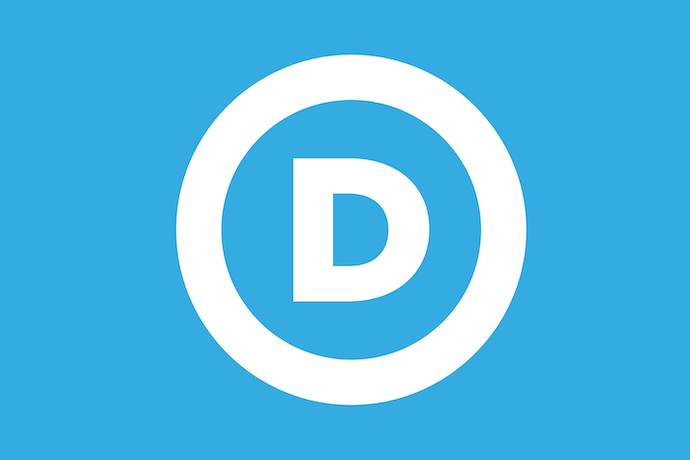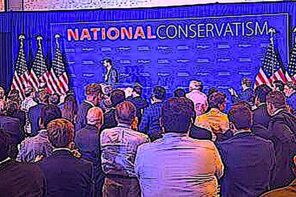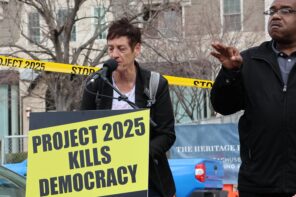What does it mean to put pluralism into practice? This is a serious question of civic life that the Left has unfortunately neglected, allowing the “respectable” Christian Right to weaponize the concept as part of the drive to legally enshrine an understanding of “religious freedom” as the right of conservative Christians to discriminate against members of othered groups. Thankfully, the Democratic Party is finally beginning to have serious conversations about pluralism as inclusion and equal accommodation in the public square, thanks largely to the efforts of secular advocates and activists.
In 2016, Sarah Levin, then of the nonpartisan organization Secular Coalition of America, began working with Texan advocates of church-state separation who were looking for ways to give the non-religious a voice in the Texas Democratic Party. As a result of their collaboration, the TDP included three relevant planks in its party platform, including a demand to revoke a religious test for office still included in the Texas state constitution. While the provision isn’t officially enforceable, Levin calls it “an important symbol of the de facto religious test that nonreligious folks continue to face when they run for office.”
More important for the future of secularism in the Democratic Party, however, is what happened next, when over 300 people turned up for the new Secular Caucus at the 2016 Texas Democratic Party Convention. As Levin says, “given the very limited marketing we were able to do preceding the event, there was really only one explanation—when Texas Democrats got their convention program and saw a Secular Caucus on the schedule, they made a beeline for it.”
The momentum generated by this event led Levin, now the Co-Chair of the Democratic National Committee’s Interfaith Council, to push successfully last year for the passage of the DNC’s resolution 38, which recognizes the contributions of non-religious Americans to society and to the party. She sees this experience as “a testament to how much we can accomplish within the Democratic Party when we simply engage in these conversations and make our case for representation.” It probably doesn’t hurt that the “nones”—those unaffiliated with any religious community—are now the Democratic Party’s largest faith constituency.
Fast forward to the present, when Levin was able to organize an inaugural webinar, “Making America Constitutional Again,” for the new organization Secular Democrats of America. The event, which took place yesterday, on the second day of the Democratic National Convention, featured an impressive lineup of speakers organized into three panels: “Legislating Religious Freedom”; “Faith in Humanity: A Conversation with Greg Epstein and Ann Druyan”; and “Christian Nationalism and White Supremacy.”
In her opening remarks, Levin framed the organization’s goals of mobilizing nonreligious voters and ending the stigma against nonbelievers in terms of inclusion and pluralism, a topic that became a leitmotif throughout the event. Secular Democrats of America is no Bolshevik League of the Militant Godless, but instead seeks “the partnership of progressive non-religious Democrats and progressive religious Democrats” in an effort to reclaim the authentic definition of religious freedom, which includes freedom from religion, “from the GOP, which has weaponized it.” Indeed, the DNC platform now includes the choice to believe or not to believe as a fundamental human right.
Levin’s opening remarks were followed with comments from representatives of the Freethought Equality Fund PAC, Secular Democrats of Texas, and Secular Democrats of Nebraska. Then came the first formal panel, which included two members of the small-but-scrappy United States Congressional Freethought Caucus, Rep. Jared Huffman of California, and Representative Jamie Raskin of Maryland, as well as State Representative Athena Salman of Arizona and State Representative Carlos Guillermo Smith of Florida, who, focusing in particular on the use of taxpayer dollars to fund fundamentalist schools that teach “alternative facts,” called his state “a case study in what can go wrong [when the Christian Right is in power].”
The prominence of red state activists and politicians in the program comports both with the sense that they’re on the “front lines” of the Christian Right’s culture warring, a point stressed by both Salman and Smith, and with the sociological finding that in states where the Christian Right pushes anti-gay initiatives, the religiously unaffiliated demographic increases. Smith, who is openly queer, also noted that the Christian Right has weaponized its concept of “religious freedom” against the LGBTQ community in particular.
Unsurprisingly, many of the webinar’s participants spoke about the horrors wrought by the Trump administration’s rejection of science, a topic about which Druyan, the award-winning producer and writer of Cosmos, waxed poetic, emphasizing how atheists can find meaning through science and nature. “Donald Trump hates science, and he believes you can change the meteorological map with your magic marker,” she stated colorfully.
“But nature will not be deceived,” she maintained. “Science and democracy are inextricably linked, because each of them is an error-correcting mechanism.” At the same time, she noted that she and her late husband Carl Sagan befriended religious believers and worked to find common ground despite disagreements: “You don’t have to agree on how nature came to be in order to want to preserve and protect it,” she said.
The event’s final panel, which addressed Christian nationalism and white supremacism, featured Ashton P. Woods, Chair of the Black Humanist Alliance and founder of Black Lives Matter Houston; Dr. Monica Miller, Associate Professor of Religion and Africana Studies at Lehigh University; and Robert P. Jones, founder of the Public Religion Research Institute and author of the newly released White Too Long: The Legacy of White Supremacy in American Christianity.
Miller noted that “we tend to separate out whiteness from its religion of Christianity, and the other way around,” which lets Christianity off the hook for its complicity in domination and conservative politics, while Woods noted that “it took the media three-and-a-half years to say [Trump’s] a racist” and asserted that we must dismantle white supremacism everywhere we find it, including in secular communities and in the Democratic Party, which, he argues, has a responsibility to give a voice to voiceless communities. “And that is really what humanism is, is it not?” Woods concluded.
As for Jones, he noted that it’s “a challenge” to get more white Christians to embrace pluralism, but he added that this is happening within the Democratic Party. “Going forward,” said Jones, “any party that wants to be a national party is going to have to address the racial and religious diversity of this country in a robust way.”
As Levin told me, “The majority of the religiously unaffiliated demographic is aligned with Democratic values, and there are so many active Democrats who identify with what we are trying to accomplish. By giving them that space to bring their secular identity into Democratic spaces, we can activate both Democrats who are already engaged and attract new activists to the party who have long felt that they don’t belong.”
Should the religiously unaffiliated, now America’s single largest “faith” demographic, begin to vote at anything close to the rate of white evangelicals, that will indeed be a heavy blow to the anti-democratic and anti-pluralist GOP. But “God” only knows whether demographic changes in the electorate will be dramatic enough to overcome Republican attempts at voter suppression and gerrymandering.





